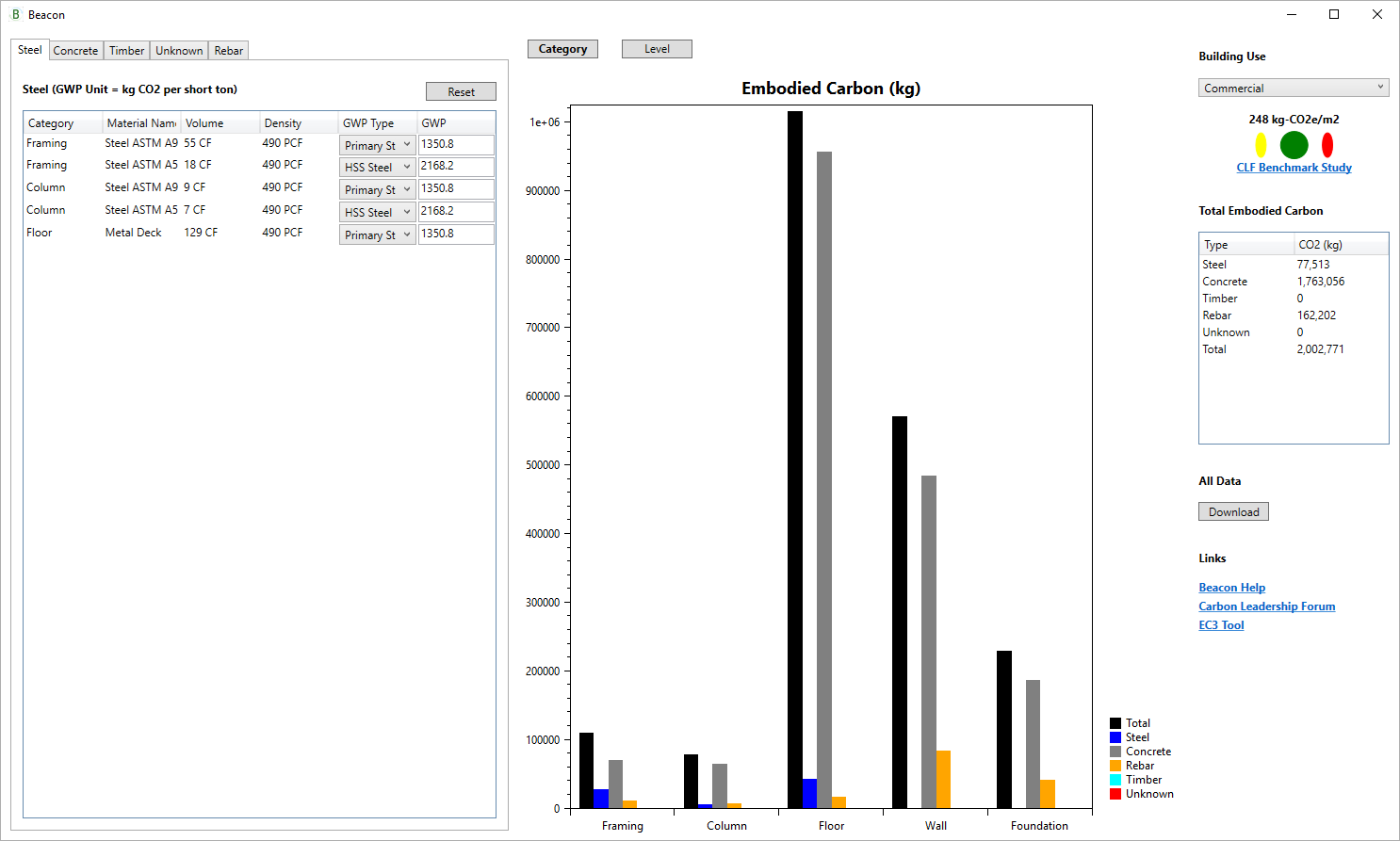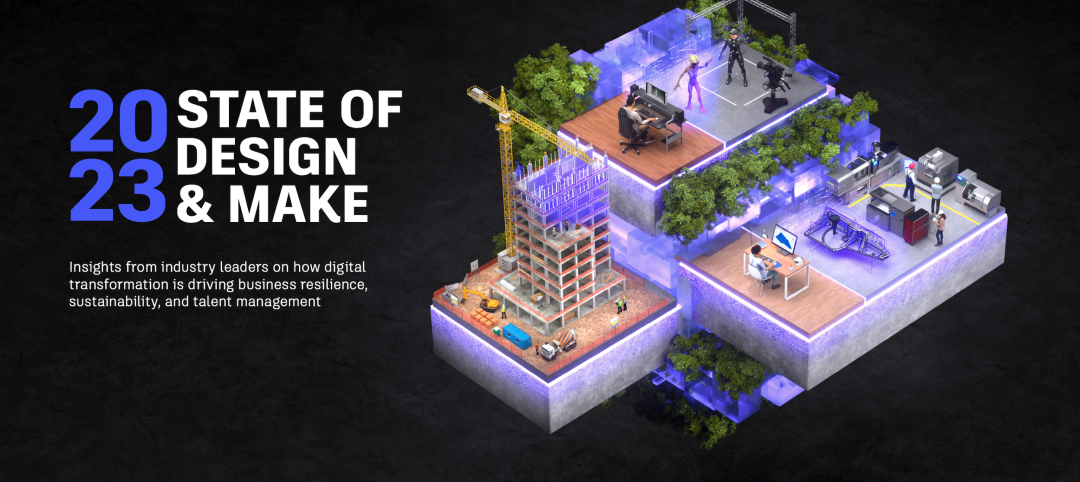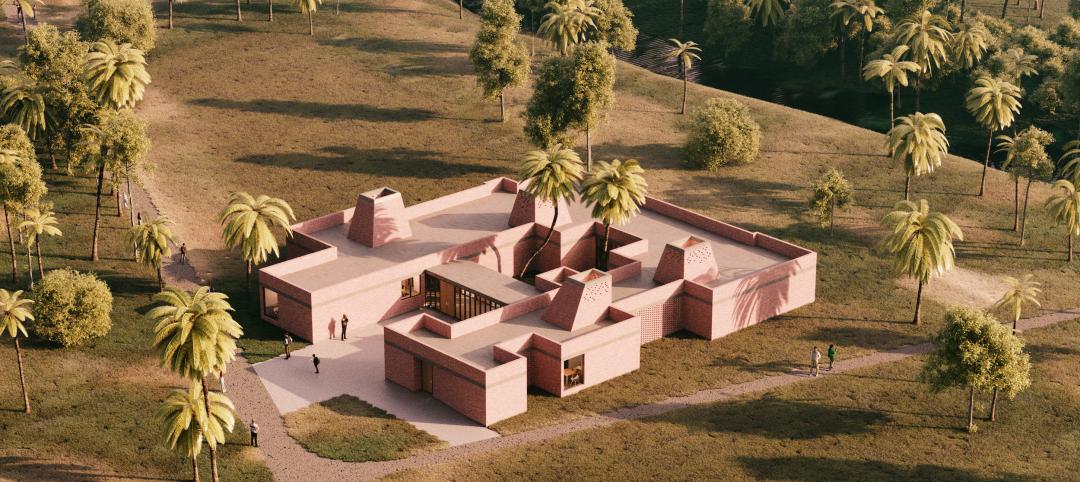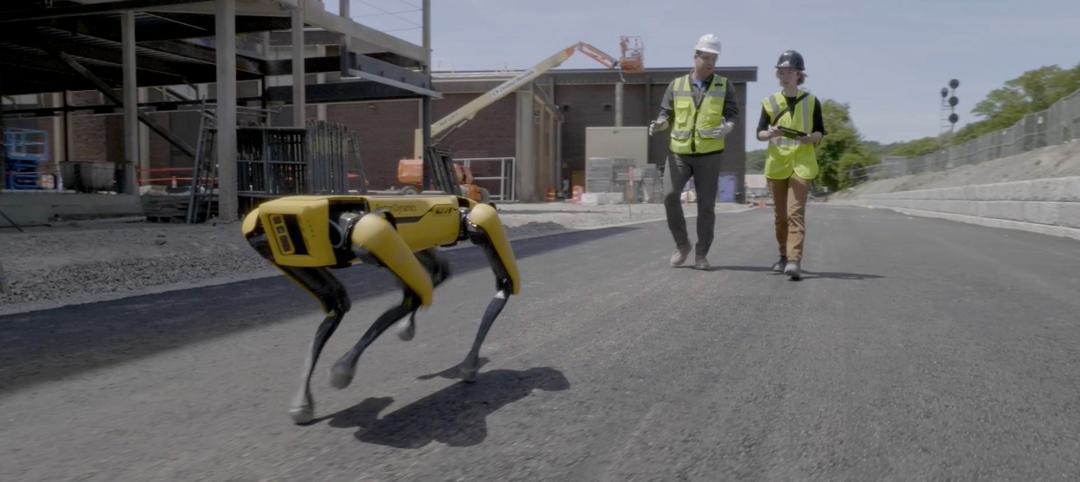Engineering giant Thornton Tomasetti has launched Beacon, an open-source embodied carbon measurement tool poised to change the way structural engineers understand and manage embodied carbon optimization. The tool gives users the ability to measure embodied carbon, allowing for more informed decisions throughout the design process.
Beacon is being introduced after an intensive, three-year research and development process led by Thornton Tomasetti’s CORE studio, a firm-wide virtual incubator focused on innovation through computational modeling and research.
The tool is an Autodesk Revit plugin that generates a comprehensive data visualization of a project’s embodied carbon. Beacon provides data in a manner similar to the engineer’s thought process, providing a clear visualization of a project’s embodied carbon quantities by material type, building element and floor levels, allowing engineers to know exactly where embodied carbon can be minimized for optimization.
It also grades the model’s embodied carbon levels against the Carbon Leadership Forum’s database of models by building type using a red, yellow, and green rating system.
embodied carbon reseach
Beacon’s launch follows Thornton Tomasetti’s November 2019 release of results from its multi-year, project-based embodied carbon measurement study. The study focused on identifying the type of structures, materials and components with the highest carbon emissions.
“We decided to make Beacon an open-source and easy-to-use tool, so it can be shared at a global scale,” said Robert Otani, Principal and Chief Technology Officer at Thornton Tomasetti. “We hope this unique and comprehensive tool will push the industry forward into developing innovative strategies that result in more sustainable and efficient structures.”
“The built environment is estimated to be responsible for about 40% of global greenhouse gas emissions when building materials are factored in,” said Amy Seif Hattan, Corporate Responsibility Officer at Thornton Tomasetti. “It is up to us to help effect change. Beacon will help structural engineers address embodied carbon in new construction. It will also be extremely valuable to measure progress toward the Carbon Leadership Forum’s Structural Engineers 2050 Challenge’s primary goal of zero carbon buildings by 2050.”
Hattan added that this challenge was recently endorsed by the Structural Engineering Institute Board of Governors, showing strong industry support for the initiative.
Beacon is available for download at: https://core-studio.gitbook.io/beacon.
Related Stories
Sustainability | May 1, 2023
Increased focus on sustainability is good for business and attracting employees
A recent study, 2023 State of Design & Make by software developer Autodesk, contains some interesting takeaways for the design and construction industry. Respondents to a survey of industry leaders from the architecture, engineering, construction, product design, manufacturing, and entertainment spheres strongly support the idea that improving their organization’s sustainability practices is good for business.
AEC Tech | May 1, 2023
Utilizing computer vision, AI technology for visual jobsite tasks
Burns & McDonnell breaks down three ways computer vision can effectively assist workers on the job site, from project progress to safety measures.
AEC Tech Innovation | Apr 27, 2023
Does your firm use ChatGPT?
Is your firm having success utilizing ChatGPT (or other AI chat tools) on your building projects or as part of your business operations? If so, we want to hear from you.
Design Innovation Report | Apr 19, 2023
HDR uses artificial intelligence tools to help design a vital health clinic in India
Architects from HDR worked pro bono with iKure, a technology-centric healthcare provider, to build a healthcare clinic in rural India.
Resiliency | Apr 18, 2023
AI-simulated hurricanes could aid in designing more resilient buildings
Researchers at the National Institute of Standards and Technology (NIST) have devised a new method of digitally simulating hurricanes in an effort to create more resilient buildings. A recent study asserts that the simulations can accurately represent the trajectory and wind speeds of a collection of actual storms.
3D Printing | Apr 11, 2023
University of Michigan’s DART Laboratory unveils Shell Wall—a concrete wall that’s lightweight and freeform 3D printed
The University of Michigan’s DART Laboratory has unveiled a new product called Shell Wall—which the organization describes as the first lightweight, freeform 3D printed and structurally reinforced concrete wall. The innovative product leverages DART Laboratory’s research and development on the use of 3D-printing technology to build structures that require less concrete.
Smart Buildings | Apr 7, 2023
Carnegie Mellon University's research on advanced building sensors provokes heated controversy
A research project to test next-generation building sensors at Carnegie Mellon University provoked intense debate over the privacy implications of widespread deployment of the devices in a new 90,000-sf building. The light-switch-size devices, capable of measuring 12 types of data including motion and sound, were mounted in more than 300 locations throughout the building.
Architects | Apr 6, 2023
New tool from Perkins&Will will make public health data more accessible to designers and architects
Called PRECEDE, the dashboard is an open-source tool developed by Perkins&Will that draws on federal data to identify and assess community health priorities within the U.S. by location. The firm was recently awarded a $30,000 ASID Foundation Grant to enhance the tool.
AEC Tech | Mar 14, 2023
Skanska tests robots to keep construction sites clean
What if we could increase consistency and efficiency with housekeeping by automating this process with a robot? Introducing: Spot.
Modular Building | Mar 3, 2023
Pallet Shelter is fighting homelessness, one person and modular pod at a time
Everett, Wash.-based Pallet Inc. helped the City of Burlington, Vt., turn a municipal parking lot into an emergency shelter community, complete with 30 modular “sleeping cabins” for the homeless.

















